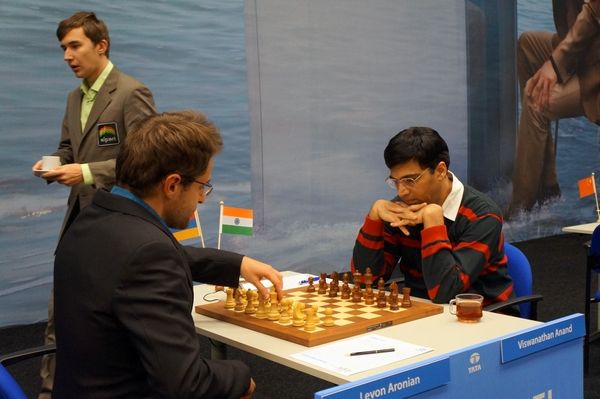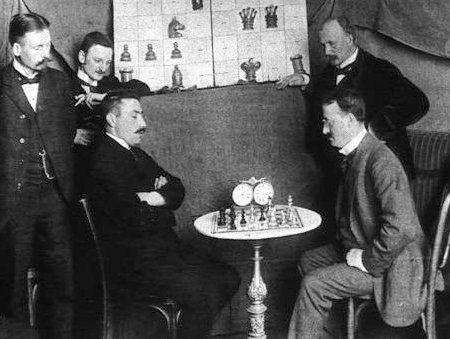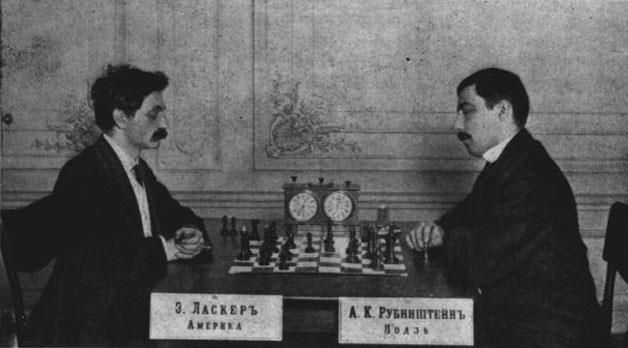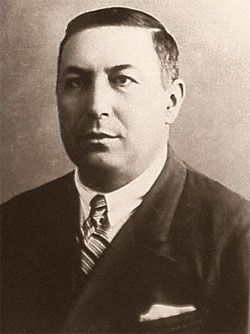Within me, I behold a Beast, an Angel, and a Madman
December 01 happens to be the birthday of the first principal of modern endgame's school of witchcraft and wizardry. Akiba Rubinstein was born on this day 136 years back in Poland and went on to become one of the best players in the world. Read his story and know why Anand and Gelfand are so fond of him. A tribute by Aditya Pai.
Within me, I behold a Beast, an Angel, and a Madman

Scrolling through the seemingly endless posts on my Facebook news feed several months ago, I happened to stumble upon this quote of Dylan Thomas; and within a moment, the quote transpired into an image - the image of Akiba Rubinstein.
Indeed he was a beast for his prowess over the chessboard, an angel for his contributions to our beloved game and a madman for what he later became. His was that romantic image of a chess player which inspired filmmakers and storytellers alike. Be it Nabokov's Alexandr Ivanovich Luzhin or the manifold mad characters in Liz Garbus’ Bobby Fischer against the World, all seem to bear some resemblance to Akiba's state post-1932.
But despite the farrago of poverty and mental instability that plagued his chess career, Akiba fought on… although the war had conspired to elbow him off his chance to win the world title; although his schizophrenic phantoms made him hide in corners of tournament halls; he played, he fought.
The Opening
Akiba was born whilst winter had commenced painting days in dazzling white hues on December 1, 1880 - exactly 136 years ago - to a Jewish family in Stawiski, a town in the north-eastern part of Poland. His life, right from the outset, was poverty stricken. His father had died a few weeks before his birth. Given the ancestry of his family, of Rabbis and Jewish religious scholars, Akiba – as he was expected to – pursued religious studies, to become a Rabbi.
It was on one of those days at the religious school that he stumbled upon two students playing chess. In an instant, he was fascinated. Then on, sidelining his rabbinical studies, Akiba devoted most of his time to studying chess. He was 16 at the time; a relatively late start one might say. But his success was quick and intriguing. Within a few years, Akiba was able to beat every player around. That’s when he got to know about a real chess master, Gersz Salwe, who lived in Lodz. Salwe, at the time, was known to give odds to his opponents and beat them.
Akiba now knew where he would find stronger opposition. But when he arrived in the city, he found himself losing to even those who Salwe would beat giving odds. After several tries, in 1903, he finally tied a match 7-7 against Salwe. Within a year, a rematch was arranged. And to the surprise of many at the time, Akiba emerged as the victor.
This is approximately when he decided to quit his rabbinical studies entirely and devote himself completely to chess. The decision was mourned upon by his family who wanted him to follow the well-trodden path of his ancestors. While his mother prayed the lord to grant her son the wisdom to come back, Akiba was preparing religiously to shock the world’s elite with his moves. It was in the year 1907 that he played the classic game, Rubinstein’s Immortal (against Rotlewi), which Anand admitted to have remembered while delivering his monstrous attack against Aronian at the Tata Steel 2013. Do experience the two brilliancies for yourself below.
Rotlewi vs Rubinstein, Lodz, 1907 (Notes by Carl Schlechter and Savielly Tartakower)
[Site "Lodz POL"]
[Date "1907.12.26"]
[Round "?"]
[White "Georg Rotlewi"]
[Black "Akiba Rubinstein"]
[Result "0-1"]
[ECO "D32"]
[PlyCount "50"]
[EventDate "1907.??.??"]
[SourceDate "2003.06.08"]
e3 c5 4. c4 Nc6 5. Nc3 Nf6 6. dxc5 {Tartakower: Less consistent than 6.a3 or 6.
Bd3, maintaining as long as possible the tension in the center.} Bxc5 7. a3 a6
8. b4 Bd6 9. Bb2 O-O 10. Qd2 {? Schlechter: A very bad place for the queen.
The best continuation is 10.cxd5 exd5 11.Be2, followed by O-O. *** Tartakower:
Loss of time. The queen will soon have to seek a better square (14.Qe2). The
most useful move is 10.Qc2.} Qe7 {! Schlechter: A fine sacrifice of a pawn. If
11.cxd5 exd5 12.Nxd5? Nxd5 13.Qxd5 Rd8! and Black has a strong attack.} 11. Bd3
{Schlechter: Better was 11.cxd5 exd5 12.Be2.} dxc4 12. Bxc4 b5 13. Bd3 Rd8 14.
Qe2 Bb7 15. O-O Ne5 {! Schlechter: Introduced by Marshall and Schlechter in a
similar position with opposite colors, but here with the extra move Rd8.} 16.
Nxe5 Bxe5 {Tartakower: Threatening to win a pawn by 17...Bxh2+ 18.Kxh2 Qd6+.
White's next move provides against this, but loosens the kingside defenses.}
17. f4 Bc7 18. e4 Rac8 19. e5 Bb6+ 20. Kh1 Ng4 {!} 21. Be4 {Schlechter: There
is no defense; e.g., 21.Bxh7+ Kxh7 22.Qxg4 Rd2 etc.; or 21.h3 Qh4 22.Qxg4 Qxg4
23.hxg4 Rxd3, threatening ...Rh3 mate and ...Rxc3; or 21.Qxg4 Rxd3 22.Ne2 Rc2
23.Bc1 g6! threatening ...h5; or 21.Ne4 Qh4 22.h3 (if 22.g3 Qxh2+ 23.Qxh2 Nxh2
and wins.) 22....Rxd3 23.Qxd3 Bxe4 24.Qxe4 Qg3 25.hxg4 Qh4+ mate.} Qh4 22. g3 {Schlechter: Or 22.h3 Rxc3! 23.Bxc3 Bxe4 24.Qxg4 Qxg4 25.hxg4 Rd3 wins. ***
Tartakower: The alternative 22.h3, parrying the mate, would lead to the
following brilliant lines of play: 22...Rxc3! (an eliminating sacrifice,
getting rid of the knight, which overprotects the bishop on e4) 23.Bxc3 (or 23.
Qxg4 Rxh3+ 24.Qxh3 Qxh3+ 25.gxh3 Bxe4+ 26.Kh2 Rd2+ 27.Kg3 Rg2+ 28.Kh4 Bd8+ 29.
Kh5 Bg6+ mate) 23...Bxe4+ 24.Qxg4 (if 24.Qxe4 Qg3 25.hxg4 Qh4+ mate) 24...Qxg4
25.hxg4 Rd3 with the double threat of 26...Rh3+ mate and 26....Rxc3, and Black
wins. Beautiful as are these variations, the continuation in the text is still
more splendid.} Rxc3 {!!} 23. gxh4 Rd2 {!!} 24. Qxd2 Bxe4+ 25. Qg2 Rh3 {!} 0-1


Anand says: 'And here, the game which kept on coming to my mind was the famous
classic Rotlewi-Rubinstein. For me, it's just a classic. I imagine for Gelfand
also. He would have remembered it effortlessly, first of all, he knows his
classics and secondly it is Rubinstein. He is one of his big heroes.
Rubinstein's main point was to invade with both rooks, but except for this it
is very similar.'
Levon Aronian-Viswanathan Anand (Notes by Anand in English and German)
[Site "Wijk aan Zee"]
[Date "2013.01.15"]
[Round "4"]
[White "Aronian, Levon"]
[Black "Anand, Viswanathan"]
[Result "0-1"]
[ECO "D46"]
[WhiteElo "2802"]
[BlackElo "2772"]
[Annotator "Anand,V"]
[PlyCount "46"]
[EventDate "2013.01.12"]
[EventType "tourn"]
[EventRounds "13"]
[EventCountry "NED"]
[EventCategory "20"]
[SourceTitle "CBM 153"]
[Source "ChessBase"]
[SourceDate "2013.03.14"]
which made a perfect start for the New Year. Dies war in der 4. Runde. Gerade
am Vortag hatte Fabiano Caruna geschlagen, was einen perfekten Start für das
neue Jahr abgab.} 1. d4 d5 2. c4 c6 {We went for the Slav Defence, which was
no big surprise. We played this many time before, with reversed colours as
well. Wir wählten die Slawische Verteidigung, was keine große Überraschung war.
So haben wir viele Male zuvor gespielt, auch mit umgekehrten Farben.} 3. Nf3
Nf6 4. Nc3 e6 5. e3 {He goes e3 actually more often, but recently he has been
playing Bg5 a bit. Er wählt häufiger e3, aber in letzter Zeit hat er auch ein
wenig Bg5 gespielt.} Nbd7 6. Bd3 dxc4 7. Bxc4 b5 8. Bd3 Bd6 {I went for 8...
Bd6, already one idea was exactly what happened in the game. I wanted to see
if he would give me a chance to play 11...Rc8. Ich wählte 8...Bd6, eine Idee
war bereits genau das, was in der Partie passiert. Ich wollte sehen, ob er mir
die Chance geben würde, 11...Rc8 zu spielen.} 9. O-O O-O 10. Qc2 Bb7 11. a3 Rc8
{This is actually an amazing move. Dies ist in der Tat ein erstaunlicher Zug.}
({It used to be that everyone played automatically, in order to play c5,
Früher war es so, dass jedermann, um c5 zu spielen, automatisch} 11... a6 {
and then recently I noticed some games with 11...Rc8. zog, und dann fielen mir
kürzlich ein ein paar Partien 11...Rc8 auf.}) ({Let's imagine the position of
the game line after Vergegenwärtigen wir uns die Stellung des Partieabspiels
nach} 11... a6 12. Ng5 Bxh2+ 13. Kxh2 Ng4+ 14. Kg1 Qxg5 15. f3 {0-1 (53) Anand,
V (2791)-Aronian,L (2750) Linares 2009. There are many games played with this.
White has good compensation with the pair of bishops and the weak dark squares
in return of the extra pawn. In fact I lost a game to Aronian in 2009, though
I was winning. But I managed to confuse myself: Damit wurden viele Partien
gespielt. Für den Mehrbauern hat Weiß gute Kompensation mit dem Läuferpaar und
den schwachen dunklen Feldern. Tatsächlich verlor ich im Jahr 2009 gegen
Aronian, obwohl ich auf Gewinn stand. Aber ich schaffte es, mich selbst zu
verwirren:}) 12. Ng5 {This is the typical reaction and a very logical move.
Dies ist die typische Reaktion und ein ganz logischer Zug.} ({Already one
point of 11...Rc8 was shown in a game between Topalov and Kasimdhanov, a few
months back, where after Eine Pointe von 11...Rc8 wurde bereits in einer
Partie zwischen Topalov und Kasimdhanov gezeigt, ein paar Monate zuvor, wo nach
} 12. b4 {Black played Schwarz trotzdem} c5 {anyway. It's interesting: In the
whole line Black wants to play c5 without even bothering to protect the
b5-pawn. So there is an implied pawn sacrifice in every one of these moves.
spielte: Es ist interessant: In dem ganzen Abspiel will Schwarz c5 durchsetzen,
ohne sich um die Deckung des b5-Bauern überhaupt zu kümmern. Jeder dieser Züge
beinhaltet somit ein Bauernopfer.} 13. bxc5 Bxf3 14. gxf3 Nxc5 15. dxc5 Rxc5
16. f4 Nd5 17. Bb2 Nxc3 18. Bxc3 Qc7 19. Rfc1 Rc8 20. Bxh7+ Kh8 21. Bd3 Rxc3
22. Qxc3 Qxc3 23. Rxc3 Rxc3 24. Bxb5 Bxa3 25. Kg2 g6 26. Rd1 Rc7 27. Rd7 Rxd7
28. Bxd7 Kg7 29. e4 Kf6 30. Kf3 a5 31. e5+ Ke7 32. Ba4 Bc5 33. h3 Bb6 34. Bb5
Bc5 35. Ba4 Bb6 36. Bb5 Bc5 37. Ba4 {1/2-1/2 (37) Topalov,V (2752)
-Kasimdzhanov,R (2684) London 2012}) {Our big point, which we found while
preparing for the match against Gelfand, was the move Unser großer Wurf, den
wir bei der Vorbereitung auf das Match gegen Gelfand fanden, war der Zug} 12...
c5 $1 {So it looks like that for almost all what White does, Black can just
play c5. So the advantage of 11...Rc8 is that for the next move you have no
difficulty remembering... Es sieht also so aus, dass bei nahezu allem, was
Weiß tut, Schwarz einfach c5 spielen kann. Der Vorteil von 11...Rc8 liegt ergo
darin, dass man für den nächsten Zug keine Schwierigkeiten hat, sich zu
erinnern...} ({After 11...Rc8 12.Ng5 looks even stronger then after 11...a6,
because if you play Nach 11...Rc8 seiht 12.Ng5 sogar noch stärker aus als nach
11...a6, denn wenn man} 12... Bxh2+ 13. Kxh2 Ng4+ 14. Kg1 Qxg5 {then the R on
c8 is worse than the pawn on a6. spielt, dann steht der R auf c8 schlechter
als der Bauer auf a6.}) {He went Er zog.} 13. Nxh7 ({instead of statt} 13.
Bxh7+ {I give one variation, just to illustrate the thing: Ich gebe eine
Variante an, nur um die Sache zu illustrieren:} Kh8 14. Be4 Nxe4 15. Ngxe4 Bb8
$44 {and in fact, ...Qh4 is coming and the Rc8 and the black bishops are
perfectly placed. und dann steht ...Qh4 ins Haus, und der Rc8 und die
schwarzen Läufer sind perfekt platziert.}) {and I went , und ich wählte} 13...
Ng4 {This is the first point: Instead of taking the knight on h7, Black simply
moves his own. Dies ist die erste Pointe: Statt den Springer auf h7 zu
schlagen, bewegt Schwarz einfach seinen eigenen.} 14. f4 {Levon was very much
finding the way at the board. So he decided to go f4 instead of h3, which has
to be said is a little bit safer. Levon fand den Weg praktisch am Brett.
Deshalb entschied er sich für f4 statt h3, was zugegebenermaßen ein bisschen
sicherer ist.} ({I give a variation with Ich führe eine Variante mit} 14. h3 {
This line is self evident and in fact if you analyse with the computer a
little bit, it will show all the direct lines. an. Diese spricht für sich, und
wenn man ein bisschen mit dem Computer analysiert, wird dieser all die
direkten Abspiele zeigen.} Bh2+ $1 15. Kh1 Qh4 16. Be4 (16. d5 Rfd8 $44) 16...
Bxe4 17. Qxe4 f5 18. Qxe6+ Kxh7 19. Qxd7 cxd4 20. exd4 Bb8 21. Kg1 Bh2+ 22. Kh1
$11 {The main line ends in a draw, which is quite satisfactory from Black's
point of view. Das Hauptabspiel endet mit Remis, was aus der Sicht von Schwarz
völlig zufriedenstellend ist.}) 14... cxd4 15. exd4 {After this I actually
could not remember, what we had prepared. This was a bit of a problem, because
this is not the position where you could make a half move or a position that
plays itself. You have to make an exact move, because there is a rook hanging
on f8 and a lot of action. You have to do the right thing. And there are some
possibilities. I was considering moves like 15...e5, 15...Nde5, 15...Qh4, etc.
But none of them made a lot of sense. And then I got the key. Though I could't
remember the variations, I rememberd that in some lines my knight gets to d3.
So I mainly rembered the position where my knight gets to d3 and from this I
managed to reconstruct and find this move ...Bc5. Hiernach konnte ich mich
tatsächlich nicht mehr daran erinnern, was wir vorbereitet hatten. Das war ein
gewisses Problem, denn dies ist keine Stellung, wo man einen Halbzug machen
kann oder sich die Position von selbst spielt. Man muss einen genauen Zug
machen, da auf f8 ein Turm hängt und eine Menge los ist. Man muss das Richtige
tun. Und es gibt einige Möglichkeiten. Ich erwog Züge wie 15...e5, 15...Nde5,
15...Qh4 usw. Aber keiner davon war besonders sinnvoll. Und dann bekam ich den
Schlüssel. Obwohl ich mich nicht an die Varianten erinnern konnte, wusste ich
noch, dass in einigen Abspielen mein Springer nach d3 kommt. Also erinnerte
mich also hauptsächlich an die Stellung, wo mein Springer nach d3 kommt, und
daraufhin gelang es mir, die Sache zu rekonstruieren und diesen Zug ...Bc5 zu
finden.} ({I remembered the line Ich erinnerte mich an das Abspiel} 15. Nxf8
Bxf8 16. h3 dxc3 17. hxg4 Nf6) 15... Bc5 $1 16. Be2 {I think this is the real
mistake. Ich glaube, dies ist der wirkliche Fehler.} ({I give a line, which is
fairly straight forward: Ich gebe ein Abspiel an, was ziemlich geradlinig ist:
} 16. dxc5 Nxc5 17. Nxf8 Nxd3 {Black is very, very comfortable with the knight
on d3, but it might be not enough. White might get some sort of half playable
position like the variation here: Schwarz steht sehr, sehr bequem mit dem
Springer auf d3, aber es ist vielleicht nicht genug sein. Weiß könnte eine
halbwegs spielbare Stellung bekommen, wie in der Variante hier:} 18. h3 Qd4+
19. Kh1 Ndf2+ 20. Rxf2 Nxf2+ 21. Kh2 Kxf8 22. Qh7 Nd3 23. Qh8+ Ke7 24. Qh4+ f6
25. Qg3 Kf7 26. Be3 $11) {Again it took me a while, not too long, but the
essential idea was very clear. So I found Erneut brauchte ich eine Weile,
nicht allzu lang, aber die Kernidee war glasklar. Daher fand ich} 16... Nde5 $3
{This is simply a brilliant move. So if there is a single move of which I am
really proud in this game, it is move 16. Dies ist einfach ein brillanter Zug.
Wenn es also einen Zug gibt, auf den ich in dieser Partie wirklich stolz bin,
dann ist es der 16.} ({Here I was thinking again: Hier überlegte ich erneut:}
16... Bxd4+ 17. Kh1 Nxh2 (17... Nde5 18. fxe5) {but the problem with that is ,
aber das Problem dabei ist} 18. Ng5 $1) 17. Bxg4 ({Now, after Nach} 17. fxe5 {
I have habe ich jetzt} Qxd4+ 18. Kh1 Qg1+ 19. Rxg1 Nf2#) 17... Bxd4+ 18. Kh1
Nxg4 {And here, the game which kept on coming to my mind was the famous
classic Rotlewi-Rubinstein. For me, it's just a classic. I imagine for Gelfand
also. He would have remembered it effortlessly, first of all he knows his
classics and secondly it is Rubinstein. he is one of his big heroes.
Rubinstein's main point was to invade with both rooks, but except for this it
is very similar. Und hier war die Partie, die mir ständig in den Sinn kam, der
berühmte Klassiker Rotlewi-Rubinstein. Für mich ist es einfach ein Klassiker.
Ich vermute, für Gelfand auch. Er sich mühelos daran erinnern können, erstens
kennt er seine Klassiker, und zweitens ist Rubinstein einer seiner großen
Helden. Rubinsteins Hauptpointe war, mit beiden Türmen einzudringen, aber
davon abgesehen ist es ganz ähnlich.} 19. Nxf8 {Here the alternatives were
very clear. In fact, for the rest of the game, there is not much commentary to
give. I will just highlight one or two key things. Hier waren die Alternativen
ganz klar. Tatsächlich ist für den Rest der Partie kein großer Kommentar mehr
erforderlich. Ich werde lediglich ein oder zwei Schlüsseldinge betonen.} (19.
Ng5 f5 20. h3 Rf6 21. Nf3 Rh6 $19) 19... f5 $1 {This move I like very much.
Here, I didn't take much time, because the ideas are very obvious. The queen
is coming to h4, or it's going to f6, capturing the knight and White really
has never a defence. So this was also very easy. Dieser Zug gefällt mir. Hier
brauchte ich nicht viel Zeit, denn die Ideen sind sehr offensichtlich. Die
Dame kommt nach h4, oder sie geht nach f6, Schlagen des Springers, und Weiß
hat nie wirklich eine Verteidigung. Das war also ziemlich einfach.} 20. Ng6 Qf6
21. h3 ({The only thing is, on Das Einzige ist, auf} 21. Ne5 {you have to find
muss man} Nxh2 $8 $19 {It's the only move, but it wins. finden. Es ist der
einzige Zug, aber er gewinnt.}) 21... Qxg6 {The other thing is, though Black
is attacking very slowly, Qf6, Qxg6, Qh5 and so on, there is very little White
can do, because of the power of my bishops and the knight on g4. Die andere
Sache ist, obwohl Schwarz sehr langsam angreift, Qf6, Qxg6, Qh5 und so weiter,
gibt es sehr wenig, was Weiß tun kann, und zwar aufgrund der Kraft meiner
Läufer und des Springers auf g4.} 22. Qe2 Qh5 23. Qd3 $2 {This loses
immediately, but the alternative would not have changed the result... Dies
verliert sofort, aber die Alternative hätte das Ergebnis nicht verändert...} ({
There was an alternative here Es gab hier eine Alternative:} 23. Rf3 Nf2+ 24.
Kh2 (24. Rxf2 Qxh3+ 25. Kg1 Qxg2#) 24... Bxf3 25. Qxf3 Qxf3 26. gxf3 Bxc3 (
26... Nd3 $19) 27. bxc3 Rxc3 $19) {After Nach} 23... Be3 {it finishes
immediately. So, one of the best games of my life obviously! Especially
against a giant like Levon. I was very happy, it was a rest day, very nice...
fällt sofort der Vorhang. Also, eine der besten Partien meines Lebens,
offensichtlich! Zumal gegen einen Giganten wie Levon. Ich freute mich sehr, es
war ein Ruhetag, sehr schön...} 0-1
The Middle-game

In the years that followed, Akiba developed himself into one of the strongest players in the world. He won many of the strongest events of the time ahead of several masters such as Ossip Bernstein, Geza Maroczy, Carl Schletcher, Frank Marshall and so forth. But he still had to beat one man – the world champion, Emanuel Lasker.

Rubinstein vs Lasker, St. Petersburg, 1909 (Notes by Lasker)
[Site "St. Petersburg RUS"]
[Date "1909.02.18"]
[Round "3"]
[White "Akiba Rubinstein"]
[Black "Emanuel Lasker"]
[Result "1-0"]
[ECO "D30"]
[PlyCount "79"]
[EventDate "1909.02.15"]
[SourceDate "2003.06.08"]
6. Nc3 cxd4 7. Nxd4 Nc6 {The cause for subsequent embarrassment. 7...Be7 was
preferable.} 8. e3 Be7 9. Bb5 {Showing up the weakness of Black's 7th move.}
Bd7 10. Bxf6 Bxf6 11. Nxd5 Bxd4 12. exd4 Qg5 13. Bxc6 Bxc6 14. Ne3 O-O-O {
A careless move. There was no reason for Black to desist from his intention of
capturing the g-pawn simply because White has omitted Qe2+. As a matter of
fact, after ...Bxg2 15 Rg1 Qa5+ 16 Qd2 Qxd2+ 17 Kxd2 Be4 Black would have been
quite comfortable.} 15. O-O Rhe8 16. Rc1 {! A very subtle move. What with the
threat of Rc5 and d5, White retains his advantage, and he can certainly cope
with Black's threat of ...Rxe3.} Rxe3 17. Rxc6+ bxc6 18. Qc1 {!} Rxd4 19. fxe3
Rd7 20. Qxc6+ Kd8 21. Rf4 {! A splendid idea, threatening to decide the game
at once by Qa8+, followed by a Rook check on e4 or c4; hence, Black is forced
to swap Queens and to face a lost ending.} f5 22. Qc5 Qe7 {After 22...Rd1+ 23
Kf2 Rd2+ 24 Ke1 Qxg2 White would win the Rook by 23 Qa5+.} 23. Qxe7+ Kxe7 24.
Rxf5 Rd1+ 25. Kf2 Rd2+ 26. Kf3 Rxb2 27. Ra5 Rb7 28. Ra6 Kf8 29. e4 Rc7 30. h4
Kf7 31. g4 Kf8 32. Kf4 Ke7 33. h5 h6 34. Kf5 Kf7 35. e5 Rb7 36. Rd6 Ke7 37. Ra6
Kf7 38. Rd6 Kf8 39. Rc6 Kf7 40. a3 1-0
Having won his game against Lasker, Rubinstein was leading the tournament until the last round when Lasker caught up and tied for first. He had now defeated the world champion and was longing to snatch his coveted crown. In subsequent years, Akiba made several attempts to arrange a match for the world title but failed consistently in raising funds demanded by Lasker. Lasker, being the world champion, had the privilege of making such demands, as he could handpick any prospective contender for his challenger.
Whilst arranging funds to meet the demands of Lasker and making valuable contributions to the opening theory, Akiba reached the prime of his career in 1912 when achieved the unprecedented feat of winning five consecutive international events, namely: Breslau, Warsaw, Vilna, San Sebastian and Pistyan. It was also during this time that he has been considered by many to be the best player of the time. By now he had made it clear to the world that he was going to be the next world champion. He had even arranged the funds, as demanded by Lasker, and had had a match arranged to be played in the spring of 1914. Alas, that was not to be. The outbreak of the First World War shattered all possibilities for the match to take place.
The Endgame
With the end of the war ended Akiba’s prospects of clinching the world championship title. He was a different man now. Not that he had lost his ability to play extraordinarily, but the ravages of the war had taken their toll on his mind. He was now a self-doubting man whose modest, timid nature was taking the shape of anthropophobia and schizophrenia. Indeed, even during these years, he played several masterful games that continue to have a profound influence on players, even today. Some highlights of the final years of his career were Vienna, 1922, where he won ahead of the would-be World Champion, Alexander Alekhine; the 1930 Hamburg Chess Olympiad, where he led the Polish team which won the event and scored an unbeaten 15/17 (+13 -0 =4); and the 1931 Chess Olympiad where he again led the Polish team and bagged a silver.
By 1932, Akiba was forced to withdraw from competitive chess due to his mental disorders. At one point, while playing in tournaments, he would hide in corners of the playing hall, waiting for his opponent to make a move. To follow his heart, he lost his mind; but kept playing, nevertheless. He lived the remainder of his life switching his place of residence between home and sanatorium in Belgium. Mostly locked into an attic in solitude, he would analyze chess openings and prefer not to talk to anyone. He had quit bathing, shaving or clipping his beard. It’s speculated that once some Nazis had come to take him to the concentration camp. When told about his insanity, they asked him if he would like to work for the Third Reich, to which he simply said ‘yes’. This not only convinced the soldiers that he was insane but also made them let him be as he was. They thought living was a bigger suffering for him than death at the concentration camp.
Akiba died in Antwerp, Belgium on March 14, 1961. Unlike most of his contemporaries, he did not leave any literary legacy behind; but his influence on opening theory has remained timeless. Be it in the French defence or the Four Knights, the Queen’s Gambit or the Nimzo-Indian, most – if not all – of his theories have endured. He was one of the earliest exponents of the idea that the opening should be played taking the endgame into account. It was his scientific approach that won heaps of praise from masters and even world champions of all generations. GM Boris Gelfand has gone so far as to say, “What I like in chess, comes from Akiba”.
I would like to end this little encomium of mine with this rook endgame in which Akiba won from a seemingly dead drawn position.
Mattison vs Rubinstein, Karlsbad, 1929
[Site "Karlsbad"]
[Date "1929.08.04"]
[Round "4"]
[White "Matisons, Hermanis"]
[Black "Rubinstein, Akiba"]
[Result "0-1"]
[ECO "C68"]
[SetUp "1"]
[FEN "2kr4/1p4pp/p2p1p2/2pR4/4P3/5P2/PPP3PP/2K5 b - - 0 20"]
[PlyCount "37"]
[EventDate "1929.07.31"]
[EventType "tourn"]
[EventRounds "21"]
[EventCountry "CZE"]
[SourceTitle "HCL"]
[Source "ChessBase"]
[SourceDate "1999.07.01"]
27. g3 f4 28. Re2+ Kf5 29. Re4 fxg3 30. hxg3 Rg8 31. Rf4+ Ke6 32. Re4+ Kd7 33.
g4 Rf8 34. Re3 h4 35. a4 bxa4 36. bxa4 Re8 37. Kd2 Rxe3 38. Kxe3 d5 0-1

About the above endgame:
“Had Rubinstein played this endgame 300 years earlier, he would have been hanged for practicing witchcraft!” - Editor of the Carlsbad Tournament book.
About the Author

Aditya Pai is an ardent chess fan, avid reader, and a film lover. He has been an advertising copywriter and is currently pursuing a Master's in English Literature at the University of Mumbai. He loves all things German and is learning the language. He has also written scripts for experimental films.

